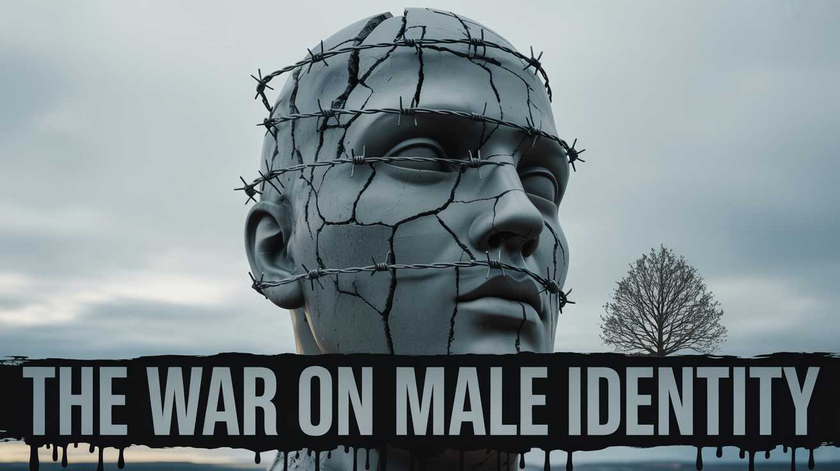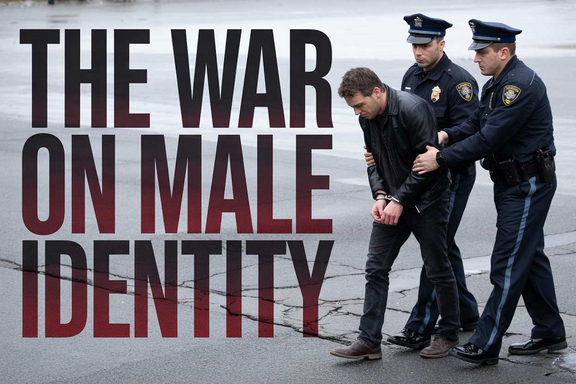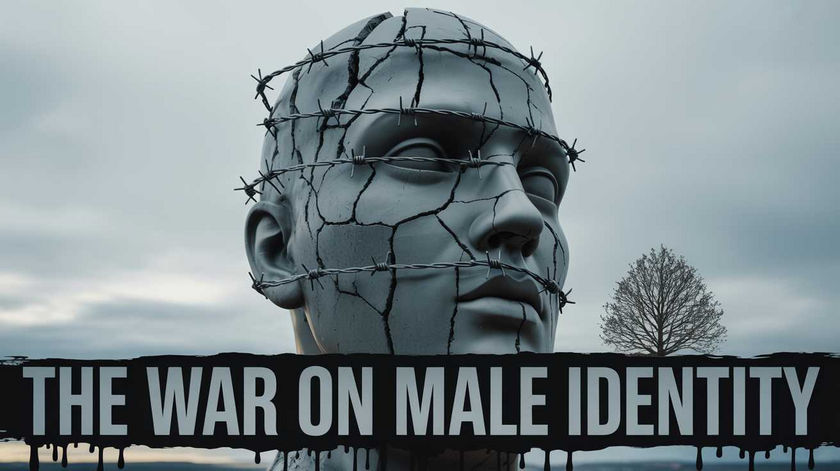
Is This Brainwashing? How Feminist Narratives Mirror Thought Reform Tactics — and Target Men
By now, most of us have heard the term “brainwashing.” It usually brings to mind Cold War images of broken POWs or disturbing cult documentaries. But what if the most pervasive forms of psychological manipulation aren’t hidden in bunkers or religious compounds — but embedded in mainstream institutions that claim to promote justice?
Psychiatrist Robert Jay Lifton, who studied Communist reeducation camps in Maoist China, laid out the classic framework for understanding brainwashing. In his landmark work, Thought Reform and the Psychology of Totalism, Lifton identified eight core mechanisms that coercive systems use to break down and reshape the self.
At the heart of it? A psychological attack on your identity — followed by shame, blame, and the expectation that you publicly confess and “rebuild” yourself according to the group’s ideology.
Sound familiar?
Over the past few decades, feminist ideology and their media and governmental allies— have used these exact tools to reshape how society sees men. Not just some men. All men. And nowhere is this more evident than in our schools, media, family courts, and even the criminal justice system.
First, Attack the Identity
Lifton observed that the first move in coercive thought reform is to undermine a person’s core identity — to instill doubt, guilt, and eventually shame. Today, men are told from boyhood that their nature is suspect. That masculinity is toxic. That their instincts, strengths, and even their emotions — especially anger — are part of the problem.
Being male is treated not as a biological or psychological trait, but as a moral flaw. Attack the identity.

Second, Shame, Blame, and Confession
Once identity is destabilized, the system demands confession. And modern institutions have become very good at this.
In HR meetings, classrooms, and even therapy, men are asked to “acknowledge their privilege,” to “own their part in the patriarchy,” and to pledge allegiance to ideologies that blame them collectively — not for what they’ve done, but for what they are.
Even worse, some of the most destructive institutions have absorbed this logic completely.
Family Courts and the Deadbeat Dad Myth
The family court system has long operated on a set of unspoken assumptions: that women are naturally more nurturing, that children belong with mothers, and that fathers — if they protest — are bitter, controlling, or dangerous.
When a man loses custody (which happens the vast majority of the time), he is then forced to pay for children he may barely be allowed to see. If he struggles financially — or dares to resist — he’s branded a “deadbeat dad” and possibly jailed. There is no presumption of innocence, no room for his story, and no empathy.
This is not justice. It’s reeducation by punishment.
Men are told that to be “good fathers,” they must obey, pay, and stay silent. They must prove they’re not what the system already assumes they are. That’s not family law. That’s psychological control dressed up in legal robes.
What we’re witnessing in the family court system is not just legal bias — it’s a full-spectrum psychological assault that mirrors Lifton’s model of thought reform. Fathers are stripped of identity (as protectors and caregivers), subjected to guilt and shame (for systemic outcomes they didn’t cause), and pressured into submission through confession and compliance. The state doesn't just want their money — it wants their silence, their obedience, and their internalized blame. In this way, the family courts don’t just separate fathers from their children — they separate men from their dignity and their purpose. It’s not just unjust. It’s indoctrination.
Domestic Violence and the Scripted Confession
Nowhere is the narrative more rigid than in the world of domestic violence policy.
For decades, feminist advocacy groups have dominated the public discourse and funding around domestic violence. The result? A cultural myth: that men are almost always the perpetrators, and women the victims.
This flies in the face of decades of peer-reviewed research — including dozens of studies showing that domestic violence is often mutual, that women initiate it just as often as men, and that male victims are frequently ignored, ridiculed, or arrested themselves when they call for help.
But the ideology doesn’t allow for nuance. The narrative is fixed: if you’re a man, you must be the problem.
Men entering anger management or court-mandated programs are often required to:
Confess their wrongdoing — regardless of the facts.
Accept their role as aggressor.
Admit they’ve internalized toxic masculinity.
Pledge to “do better” by adopting feminist-defined attitudes.
That’s not help. That’s indoctrination. The entire framework is built not on healing, but on ideological conformity.
Lifton’s Eight Mechanisms of Thought Reform Applied to Men
Lifton breaks down brainwashing into eight distinct categories, based on his observations and interviews with survivors of Communist Chinese reeducation programs in the 1950s. Disturbingly, many of these same tactics are now being used — intentionally or not — against men in today’s culture. Here’s a breakdown of how each of Lifton’s eight categories applies to the modern male experience.

1. Milieu Control
Control over communication — both internal (thoughts) and external (speech). Limits what the subject hears, says, or believes.
➤ Applied to Men:
Men today are surrounded by institutions — schools, workplaces, media, and even therapy — that present only one permitted narrative about gender: that men are privileged, women are oppressed, and masculinity is a problem to be corrected. Alternative voices are excluded, mocked, or deplatformed.
In schools, boys are taught about “male privilege” but not about male suicide, fatherlessness, or educational disadvantages.
In universities, “gender studies” often function as ideological echo chambers where dissenting views are considered harmful or even violent.
In HR departments, “equity training” frequently frames masculinity as a liability rather than a contribution.
The result? Men learn to silence their inner objections, to distrust their instincts, and to keep their mouths shut for fear of social punishment.
2. Mystical Manipulation
The ideology is presented as the ultimate moral truth. Group goals are divine, transcendent, or historically inevitable.
➤ Applied to Men:
The feminist worldview — especially its radical and institutionalized form — is not just presented as a viewpoint; it’s presented as a moral imperative. Dissent isn’t treated as reasoned disagreement; it’s treated as a moral failure.
“The future is female.”
“Patriarchy hurts everyone.”
“Believe all women.”
These slogans are not open to challenge. They carry the force of moral absolutes — as if opposing them is akin to opposing civil rights or basic human decency.
Men are told that redemption can only come through alignment with the ideology: renouncing their instincts, confessing their privilege, and proving their worth through ideological obedience.
3. Demand for Purity
Subjects must strive for an unattainable moral purity. Any sign of “impurity” is cause for guilt and self-condemnation.
➤ Applied to Men:
Being a “good man” today often means apologizing for being a man. Men are told that their masculinity is inherently toxic, their socialization inherently violent, and their very presence potentially threatening.
Even if a man is kind, respectful, and responsible, the system still implies that he benefits from a power structure that hurts women. He is never clean enough.
“Unlearn toxic masculinity.”
“Check your privilege.”
“Listen and do better.”
The purity demanded is impossible. The goalposts always move, ensuring men remain in a permanent state of moral inadequacy.
4. Confession
Subjects are encouraged or forced to confess past sins (real or invented) to reinforce guilt and dependence on the group.
➤ Applied to Men:
Men are pressured to publicly confess their complicity in systemic oppression. These confessions are often ritualized and performative, serving not to repair relationships, but to demonstrate submission to the ideology.
In court-ordered domestic violence programs, men are required to admit guilt even if the evidence is weak or contradictory.
In schools and corporations, “privilege walk” exercises and diversity sessions often push men to publicly acknowledge guilt for their race, gender, or upbringing.
This isn’t introspection — it’s coerced self-abasement. The more a man confesses, the more he is seen as redeemable — but only through compliance.
5. Sacred Science
The group’s beliefs are beyond question. The ideology is presented as absolute truth, not open to debate.
➤ Applied to Men:
Feminist theory — particularly as institutionalized in law, education, and media — is often treated as sacred and unchallengeable. Counter-evidence is not refuted — it’s ignored, ridiculed, or suppressed.
Men who cite peer-reviewed studies showing mutual or female-initiated domestic violence are dismissed.
Mentioning male educational decline, family court bias, or suicide rates is framed as “whataboutism” or a distraction.
Criticizing feminist narratives — even politely — is labeled as misogyny or “fragile masculinity.”
This ideological rigidity shuts down critical thinking, ensures conformity, and delegitimizes male perspectives.
6. Loading the Language
The group uses jargon and slogans to control thinking and shut down analysis.
➤ Applied to Men:
Language around gender has become ideologically weaponized. A handful of emotionally charged buzzwords are used to frame all male behavior as suspect — and all pushback as aggression.
“Toxic masculinity”
“Mansplaining”
“Deadbeat Dads“
“Male fragility”
“Microaggressions”
These terms are not neutral. They are thought-stoppers — designed to make discussion impossible and guilt automatic. Once a man is labeled, he is silenced.
This language also redefines common behavior (like confidence, assertiveness, or disagreement) as morally or emotionally defective — if it comes from a man.

7. Doctrine Over Person
The ideology takes precedence over individual experience. If personal reality contradicts doctrine, the doctrine wins.
➤ Applied to Men:
Men who speak up about false accusations, loss of child custody, abuse by female partners, or institutional discrimination are often ignored — not because their stories are implausible, but because they don’t fit the ideological script.
A man who’s been assaulted by a woman? He must be mistaken.
A father who wants shared custody? He must be controlling.
A male student struggling in a female-dominated classroom? He must just need to “try harder.”
His lived reality is invalid because the narrative says otherwise. The ideology is never wrong — only the man is.
8. Dispensing of Existence
Those who reject the group’s ideology are treated as morally inferior or even non-human.
➤ Applied to Men:
Men who resist ideological conformity are dehumanized — in subtle and not-so-subtle ways.
They’re called “incels,” “misogynists,” or “angry white males.”
Their pain is mocked. Their dissent is pathologized.
They are erased from public sympathy — excluded from empathy in media, policy, and law.
If a man questions the narrative, he is not just wrong — he is bad. And once labeled, he can be canceled, fired, or dismissed without remorse.
The Bigger Picture
Each of these mechanisms is powerful on its own. But together, they create a comprehensive system of psychological control — one that targets men not for what they’ve done, but for who they are.
This is not liberation. This is not equity. This is coercive persuasion, systematized and scaled through courts, classrooms, corporate policy, and cultural narratives.
It doesn’t need a prison. It doesn’t need a cult leader. All it needs is a story about men that no one is allowed to question — and institutions willing to enforce it.
What’s the Result?
We now have millions of men — fathers, husbands, sons — who’ve been subjected to a psychological system that demands shame, confession, and reprogramming. Their emotional pain is minimized. Their voices are silenced. Their identity is on trial — every day.
This isn’t just about political correctness. It’s not even about feminism anymore. It’s about control. The same kind Lifton described in totalist regimes. The same kind used in cults.
And it’s happening — quietly, efficiently — in courtrooms, classrooms, corporate boardrooms, and therapy sessions across the country.
Time to Name It
We need to start calling this what it is: coercive psychological control. Thought reform with better branding. Men aren’t broken. Masculinity isn’t toxic. But the system that wants to remake them — through shame, guilt, and forced confession — might be.
It’s time we stood up and said no. Not because we’re defensive. But because we know the truth:
No healthy culture builds itself by humiliating its men.
Men Are Good.
Please do share this post far and wide. We need to get the word out. Thanks for your help with this. Tom



















